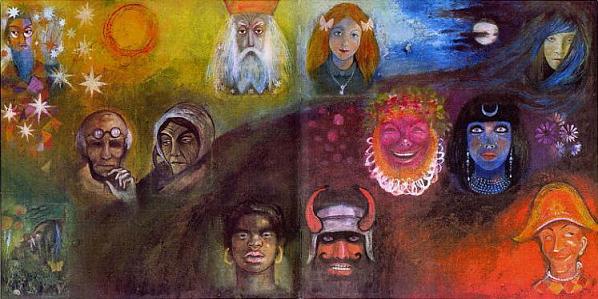The Ancient Art of Arkhelogy: The Importance of the Core Self and Core Writing
~ An Appeal to International Educators, Educational Policy-Makers, and Concerned Global Citizens ~
[Note: This is the first part in a seven-part series.]
PART ONE: Arkhelogy: A Gateway to the Self
Arkhelogy, as defined, described, and discussed in this series, is a lost art. It is a human ability that fell -- over two thousand years ago, slowly, across several hundred years through the course of human events -- into disuse. While, despite its cultural repression, remnants of this ability have continued to emerge spontaneously here and there, we no longer recognize or understand it. It is, however, as I argue in this series, an ability that is essential to the survival of the human race.
Arkhelogy is the term for the skill of “doing archetypes” -- the process and practice of discerning the archetypal as it is embodied within the actual -- that is made up of a group of component skills. Embodied in the term is the concept of the recognition and fulfillment of the Core Self through Core Writing.
Arkhelogy is a gateway to the Self, and as such, it is a gateway into harmonious relations between humans and with all life. It is therefore crucial that this skill begin to be fostered in young people by educators and parents as soon and as early possible.
This series of articles on Arkhelogy is an introduction to the approach and a proposal to incorporate an Arkhelogy Program into a standard international “high school” writing program. No significant attempt is made here to “prove” the existence or efficacy of the skill and practice of Arkhelogy. Nor is it possible, in such short space, to adequately explain fully how Arkhelogy works. Only the barest outline of the concepts, the exercises and skills can be introduced here. Like many esoteric arts, Arkhelogy must be practiced to be understood. (Thus, while my book, Archetypes for Writers: Using the Power of Your Subconscious, articulates as completely as possible the premises, skills, exercises, and concepts or Arkhelogy, neither the book nor this series can replace apprenticeship with a teacher who has mastered the skill.)
* * *
Our children are coming of age into a world full of violence and despair. Terrorism is the new watchword of our time. More and more teenagers are enlisting into the military. College programs that address terrorism and national security are springing up around the nation.

Educators have a heavy burden in such a climate and our fundamental tasks are no longer what they used to be. No longer is it a matter of whether students have mastered the basic pedagogical disciplines: math, science, critical reading, writing, etc. No longer is it a matter of proper funding for facilities, computers, books, and other materials, or proper preparation for standardized tests. No longer is it sufficient to think “only” about training for leadership, creativity, and innovation. Whether you are an essentialist, a behaviorist, a progressive, or a reconstructionist, the world has changed. Our purpose as educators must change, too.
Of course, all the things we have learned about education still matter. All the things we teach still matter. We know that students have different learning styles and different kinds of intelligences. We adapt our teaching to incorporate auditory, visual, and kinesthetic modes. We encourage students to construct knowledge rather than acquire it passively from us. All these are important and the work discussed in this paper is not intended to diminish or disregard them.
However, my discoveries reveal something separate and different from these. They reveal something that we must not do without – yet nonetheless have: an essential element that has long been missing from life and from education. While we have long understood that individual development matters, not just on a personal level but on the social level, my work reveals a deeper meaning of personal development and shows its connection to global events.

One insight that Arkhelogy reveals is that
the further we are from our real (core) writing, the more likely we are to engage in destructive, violent action.
This means that those who act out destructively and/or violently have likely found no home for their deepest selves.
This discovery has tremendous implications for world events but there is no quick or easy solution. For the educator, however, the implications are simpler and more direct: we must enable real (core) writing. (The term real or core writing are interchangeable in this article. They mean writing that is produced by the Core Self. This difficult-to-define concept is discussed in depth in my book.)
But wait. Aren't we already fostering writing? Hasn't it already been our long-standing goal to promote literacy worldwide? Many of us educators teach those who will one day be world leaders, movers and shakers, while some of us work in communities where our students are the first to read and write in their families. Every day, educators work to enable writing.
But my discoveries suggest that literacy, while intrinsically important itself, is neither sufficient nor necessary to doing one's real, core writing.
The Arkhelogy Method (Archetypes Approach)
Over the course of thirty-plus years, I developed and refined a method for enabling individuals to find and realize their characters and stories. The method and its underlying premises are not ones that were made up. I was brought to Arkhelogy by a combination of events. I can take credit only as a receiver and conveyer, not an inventor. I discovered through this process the tremendous power of the method to change people's lives.
A major premise of this approach is that your characters – those which belong exclusively to you – already exist within you – as do your stories (which are essentially the stories that involve your characters).
 |
That traditional creative writing or composition classes, or any other writing method based on the idea of developing or improving writing skills, while important to fostering those writing skills, will not be sufficient to enable you to do your own, core writing – the writing that involves those characters, which I call your real writing or your own writing.
In fact, no amount of writing activity, exercises, or practice will, of its or their own accord, enable your own writing. My discovery was that what leads to doing your own writing is the use of a specific set of skills that, on the surface, may appear to have no connection to writing. Exercises that develop those skills are what make up the Archetypes Approach or Arkhelogy Method
Significantly, one's own core writing is so critical to one's development as a human being that without the ability and opportunity to pursue it, one's development will be arrested or suspended in a particular way. Education without the enabling of each individual's own writing is missing a key component of what education is meant to be.
Of course, doing “one's own writing” is not as simple as the freedom to write what one wants or the structure to write what someone else thinks is literature or scholarship (or whatever else is required). It is particularly difficult to determine or apply a criteria for what is one's own writing. Neither personal satisfaction (or dissatisfaction) with one's writing nor another person's vote of approval (or disapproval) is sufficient to make such a determination.
Only a peculiar combination of conditions can possibly enable one to determine what is one's own writing and another peculiar combination of conditions may enable one to determine what is another person's own writing. More importantly, however, there are ways to enable the emergence of one's own writing without making any determination.
The issues of what is one's own writing and how to enable it are issues that are relevant to parenting, to international education, and to international relations. We have long understood that we, as parents and educators want to develop the whole person. The concept of one’s own writing incorporates and integrates all other educational acquirements.
What is relevant in a larger context -- to world affairs and to how education intersects with world affairs -- is the consequent understanding that one's development as a human being contributes positively to human relations. One's own writing, thus, has far wider implications than self-growth. It has implications for global human relations and conditions, including those as great as war and peace. As I write in my book, Archetypes for Writers: Using the Power of Your Subconscious:
The archetypes approach thus embodies a law about the inner Self of every human being. A relatively small percentage of people today know how to find or access the inner Self. This fact has tremendous consequences to the world, to the continued viability of humankind. It affects each of us in our professional and personal relationships, and also affects the state of the world, the quality of international interrelationships, the effectiveness of diplomacy, the extent of peace (or war), of human rights, the operations of government, and so on. Support for the conclusion that our culture has lost touch with a core human ingredient, and that this loss is doing terrible damage to humankind, can be found in many places (pp. 3-4).
The archetypes approach reveals that finding a way to enable people to do their real writing is critical to the future of humankind and the survival of our planet.

___________________________________________________________________________________
PART TWO: The Archetypal – The Eternal & Eye of the Soul
PART THREE: Some Principles of the Ancient Art of Arkhelogy
PART FOUR: The Arkhelogy Program
PART X: The Arkhelogy Skill: Lost in Time
PART SIX: International High School Writing Programs
PART SEVEN: An Arkhelogy Program for International Schools
___________________________________________________________________________________

Jennifer Van Bergen is an author, educator, and environmentalist currently living in Gainesville, Florida, where she teaches English and Law at Sante Fe College. Van Bergen is a former faculty member of the New School University in NYC, where she taught a course in the Writing Program that she eventually developed into her book Archetypes for Writers: Using the Power of Your Subconscious. Van Bergen is also the author of The Twilight of Democracy: The Bush Plan for America. She has also published several scholarly law articles, including one on the 1801 electoral tie between Thomas Jefferson and Aaron Burr, here. [ jennifer.vanbergen@gmail.com ]
___________________________________________________________________________________

























